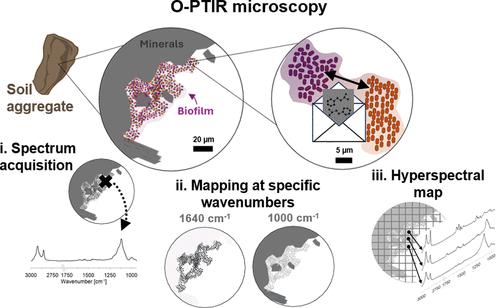当前位置:
X-MOL 学术
›
Environ. Sci. Technol.
›
论文详情
Our official English website, www.x-mol.net, welcomes your
feedback! (Note: you will need to create a separate account there.)
Probing Mineral-Organic Interfaces in Soils and Sediments Using Optical Photothermal Infrared Microscopy
Environmental Science & Technology ( IF 10.8 ) Pub Date : 2024-12-20 , DOI: 10.1021/acs.est.4c09258 Floriane Jamoteau, Mustafa Kansiz, Miriam Unger, Marco Keiluweit
Environmental Science & Technology ( IF 10.8 ) Pub Date : 2024-12-20 , DOI: 10.1021/acs.est.4c09258 Floriane Jamoteau, Mustafa Kansiz, Miriam Unger, Marco Keiluweit

|
Interactions among microbes, minerals, and organic matter are key controls on carbon, nutrient, and contaminant dynamics in soils and sediments. However, probing these interactions at relevant scales and through time remains an analytical challenge due to both their complex nature and the need for tools permitting nondestructive and real-time analysis at sufficient spatial resolution. Here, we demonstrate the ability and provide analytical recommendations for the submicron-scale characterization of complex mineral-organic microstructures using optical photothermal infrared (O-PTIR) microscopy. Compared to conventional infrared techniques, O-PTIR spectra collected at submicron resolution of environmentally relevant mineral and organic reference compounds demonstrated similar spectral quality and sensitivity. O-PTIR detection sensitivity was greatest for highly crystalline minerals and potentially for low molecular weight organic compounds. Due to photothermal effects, O-PTIR was more sensitive toward organics than minerals compared to conventional IR approaches, even when organics were mineral-bound. Moreover, O-PTIR resolved mineral-bound and unbound organics in a complex mixture at submicron (<500 nm) resolution. Finally, we provide best practices for artifact-free analysis of organic and mineral samples by determining the appropriate laser power using damage thresholds. Our results highlight the potential of O-PTIR microscopy for nondestructive and time-resolved analysis of dynamic microbe-mineral-organic matter interactions in soils and sediments.
更新日期:2024-12-20






























 京公网安备 11010802027423号
京公网安备 11010802027423号